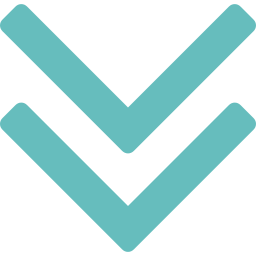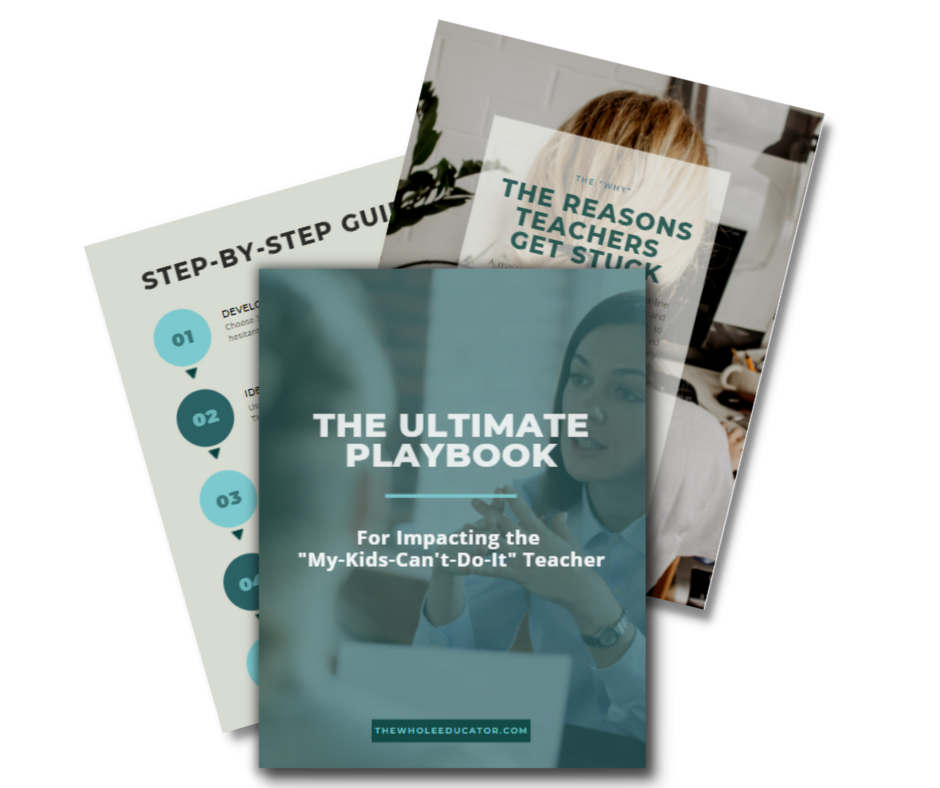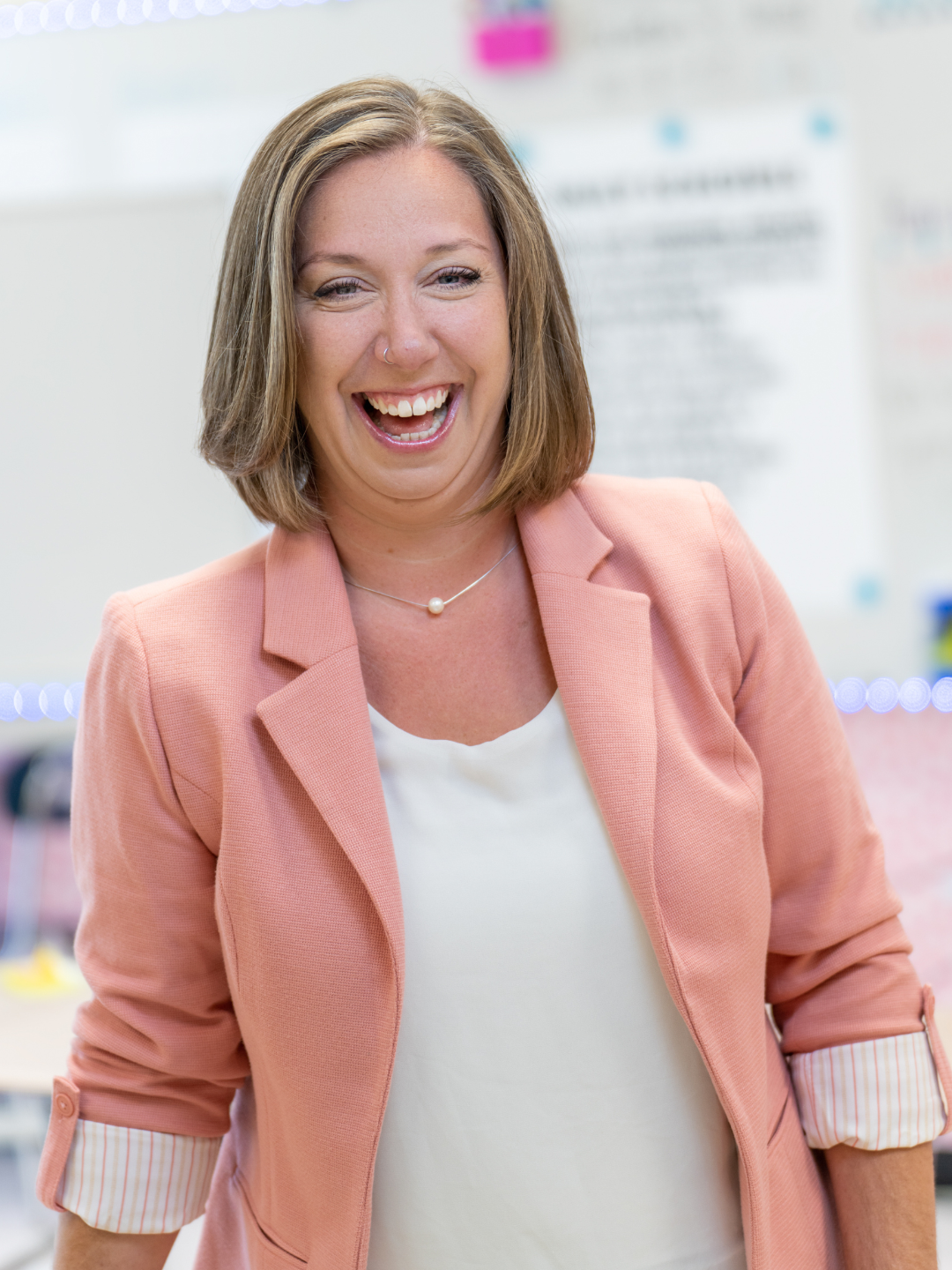
IF YOU COACH TEACHERS, THIS IS FOR YOU.
Find and develop the potential in every teacher
through a powerful coaching method that will empower even your most resistant teacher.

Can we get real for a minute?
Coaching teachers in 2023 is different.
Teachers are burned out.
You don't need me to tell you how exhausted your teachers are. They're feeling increased pressure from all directions, and they're being asked to put their lives on the line for their profession. Even your most ambitious teachers are losing hope. They're in survival mode. How are we, as coaches, supposed to help when the issues teachers face are out of our hands?
Student learning loss is real. (And the gap is only widening.)
Your teachers are feeling pressure from the district, the principal, and the parents to catch students up. In reality, the gap is only widening as students and teachers face chronic absences and a sub shortage. It feels like you're in charge of building a 7 mile long bridge in the middle of a hurricane... and you're worried about how your role will weather the storm.
Your role is more challenging now than ever before.
Being a coach also means being ready and flexible when it comes to change. But I don't think we could've predicted exactly how much change you would be expected to deal with. How are you supposed to help your teachers when circumstances are changing daily?
Imagine if...
-
You had a clear, research-based method for your coaching that helped you reach every teacher in your school.
-
You had guidance with Coaching Playbooks and workbooks when faced with the unavoidable challenges that come with your role.
-
You had a place to connect with other educators who coach teachers so you could share with people who get it.
What's Included?

Self-Paced Modules and Workbooks
Learn the Whole Educator Approach.
You were hired because of your content knowledge and skillful teaching. We build on that knowledge to help you intentionally develop your coaching skills- your ability to impact and influence your teachers.

Step-by-Step Coaching Guides
Sometimes it can be exciting to learn new coaching skills, but tough to know exactly how to apply it to your specific situation. What do I say? When do I apply this coaching move? We've got you covered with our actionable Coaching Playbooks, step-by-step guides, resources and video tutorials.
Community
Being a coach for teachers can feel isolating. Inside this community, you'll be working alongside other coaches who get it and are actively doing the work themselves. Being able to lean on the shoulders of coaches who have already completed the Whole Educator Foundations curriculum is an important support.
A closer look at the self-paced core training
(The Whole Educator Approach)
Module 1: Differentiate Levels of Willingness
Distinguish the different “levels” your teachers are on as diverse learners, and identify strategies that would support those various levels. This gives you a sense of agency in their ability to impact all teachers, no matter your teachers’ willingness to embrace challenge and change.
Module 2: Build Trust
We will break down the building blocks that make up trust as well as the behaviors and ways of being that build trust. You will learn course-specific powerful communication tools that build trust and can be immediately embedded within the job.
Module 3: Identify Mindsets and Limiting Beliefs
One of the keys to unlocking impact is to understand and recognize Growth Mindset and Fixed Mindset, and what it looks like in adults. You will learn strategies on how to support and grow adult Growth Mindsets one on one as well as support a Growth Mindset culture.
Module 4: Unpack Complaints
You will learn how useful complaints are! We “unpack” the complaints together and practice getting empowered and action-oriented around the complaints. There is an important distinction made between being empowered and toxic positivity. You will build on the mindset work and deepen your mindset-shifting practices.
Module 5: Intentionally Address Teacher Needs
Dig into my signature coaching model, called the SUSS It Out Model. This can be used in one-one-one coaching scenarios or in conversations with school leadership around shifting school culture. Using the model, you will “drill down” to uncover the source of undesirable teacher behaviors.
Module 6: Clarify Priorities and Take Focused Action
Continue looking deeply into your beliefs, mindsets and priorities. Uncover how your beliefs and commitments fit into the context of the school’s priorities. Sometimes, district-led initiatives can feel thwarting to a coach’s intentions and priorities. Here, you will learn strategies that empower you in all contexts, including reconciling their school/district priorities with your own.

Topics for Step-By-Step Guides and Resources Include...
- Encouraging reluctant teachers to engage in coaching
- Strategies to address the different types of resistance
- How to impact the different levels of resistance (according to severity and needs of the teacher)
- How to communicate so your teachers will listen
- How to work with teachers that don't believe their students can do it
- How to get your teachers to seek out coaching (instead of your seeking them out)
- Giving feedback that strengthens teacher relationships and trust
- ...and more!

Teachers can't be highly effective when they're in survival mode.
It was hard enough to get even the most resistant teachers to open up to coaching before.
Now it feels utterly impossible.
How can you help teachers improve their craft (so they can impact students who need them now more than ever) when they're yelling for a life raft?
What does The Whole Educator Approach look like?
Traditional Coaches:
- The coach has resigned to the fact that some teachers will embrace change naturally, some will be hesitant, and others will downright refuse to change. The coach doesn't see their work as a solution to this problem.
- Teachers are afraid to take risks and tend to stick to what's familiar for fear of being judged or criticized.
- The coach spends the majority of the time in the office, researching and organizing.
- The coach is more comfortable in some classrooms than in others, and spends the majority of the time observing and taking notes.
- When the coach leads a training, teachers are glancing at their phones or watching the clock. They're attending the training because they're required to do so. Implementation is hit or miss.
- Some teachers may benefit from the coaching if they take advantage of it... but not every teacher does.
Whole Educator Coaches:
- Every teacher embraces new changes because they know their coach will consider and attend to their needs as they work to implement change.
- Every teacher feels safe to try new things because they know they are fully supported on the journey to improve their practice.
- The coach is in and out of classrooms throughout the day, welcomed (and even sought out) by teachers who are actively working to implement, reflect, and share.
- The coach intentionally builds relationships with every teacher to gain a more clear understanding of their individual strengths and needs.
- When the Whole Educator Coach leads a training, teachers pay attention. They ask meaningful questions. You can see the wheels turning! Even the most resistant teacher can't help but be excited.
- Every single teacher benefits from the coaching.

Hear me out...
You've been studying the instructional design research, the curriculum, and the latest methodology. But have you been studying your coaching practice?
We expect our teachers to approach their practice with curiosity and reflection, but we don't always approach our own methods that way.
Look, I get it. You were an incredible teacher to your students, you were ambitious, innovative and effective. It should be easy to translate that to help other teachers do the same, right?
Wrong.
Coaching isn't easy. It doesn't come naturally. And just like with teaching, there are research-based methods that make some coaches more effective than others.
You need a process for coaching that allows you to fully step into your role and discover ways to engage and connect with every single teacher, transforming your school into a place where coaching and improving teaching practice and embracing change are part of the norm.
You need a supportive community of coaches who understand what it's like to serve in this capacity, and can reflect with you in meaningful ways.
You and I both know you have it in you to lead your school, even when faced with the most difficult challenges.
It's time to make the impact you were meant to make.


Here's What Coaches Are Saying...

Nadia
Teachers are now reaching out more for help. They’re reaching out now for lesson planning, more resources and information on things I’ve discussed with them. The teachers are more open to talk freely with me.

Amanda
I've been able to make things happen quicker at my school and not be so bogged down with whether people like me. Being new, I've gotten freedom from whether people like me, not making it a forefront of my concern.

Sarah
I used to not know how to explain teacher partner readiness to my admin, and now I will be able to show the [Levels of Willingness] and how my support as a coach can look different.

JOIN US INSIDE
The curriculum built with intention to support determined coaches like you.





